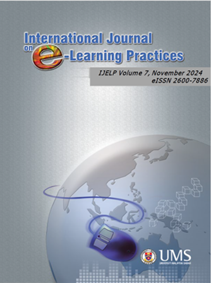THE DEVELOPMENT OF A SPOC PLATFORM FOR EFL LISTENING INSTRUCTION IN HIGHER EDUCATION
DOI:
https://doi.org/10.51200/ijelp.v7i1.5635Keywords:
SPOC, EFL Listening, Umooc Platform, digital learning, student engagementAbstract
This study focuses on the design and development of a Small Private Online Course (SPOC) specifically created for the English Listening 1 course, addressing the needs of non-English major students at a private language university in China. Hosted on the Umooc platform, the course is designed with interactive modules, multimedia resources, and task-based activities to facilitate listening comprehension and encourage student engagement. The study has two main objectives: (1) to explore the key features and functionalities of the SPOC platform, and (2) to assess how the platform’s modules align with the pedagogical goals of EFL listening instruction. Through a detailed analysis of the platform’s design, including resource sharing, task allocation, and collaborative learning opportunities, the study examines how these features are intended to enhance student engagement and support listening skill development. Additionally, the alignment of the platform’s modules with the specific pedagogical objectives of EFL listening instruction is explored to evaluate their potential for improving listening comprehension. By providing insights into the integration of digital learning into EFL instruction, this research aims to contribute to the discourse on improving student listening proficiency and engagement in higher education contexts.
References
Chen, J. (2020). SPOC-based flipped learning model applied in interpreting teaching. International Journal of Emerging Technologies in Learning, 15(17), 4–13. https://doi.org/10.3991/ijet.v15i17.14581
Fox, A. (2013). From MOOCs to SPOCs. Communications of the ACM, 56 (12), 38-40.
Gilakjani, A. P. (2011). English listening comprehension and its relation to reading comprehension. English Language Teaching, 4(1), 10-17.
Guo, Y. (2021). On translation of polysemic words in News English. English Teaching in China and the United States: English version, 18(7), 6.
Han, Y. (2017). A study on task-based teaching in college English based on SPOC
[Master’s thesis, Nanjing University of Posts and Telecommunications]. China National Knowledge Infrastructure (CNKI).
Jiang, L., & Liang, X. (2023). Influencing factors of Chinese EFL students’ continuance learning intention in SPOC-based blended learning environment. Education and Information Technologies, 28, 13379–13404.
Liu, C., Li, D., Zhang, B., & Hu, X. (2019). Systematic evaluation and meta-analysis of the effectiveness of SPOC flipped classroom teaching. Open Education Research, 25(1), 1-10.
Liu, L. (2021). Research on IT English flipped classroom teaching model based on SPOC. Scientific Programming, Article ID 7273981, 9 pages. https://doi.org/10.1155/2021/7273981
Liu, P. (2022). Design of college English news listening teaching system based on improved SPOC by using IoT. Wireless Communications and Mobile Computing, Article ID 2644521. https://doi.org/10.1155/2022/2644521
Peng, P. & Wang, J. (2024). SPOC flipped classroom blended teaching reform practices in the context of digital transformation. Applied Mathematics and Nonlinear Sciences, 9(1), 1-18.
Tharp, R. G., & Gallimore, R. (1988). Rousing minds to life: Teaching, learning, and schooling in social context. Cambridge University Press.
Vandergrift, L., & Goh, C. (2012). Teaching and learning second language listening: Metacognition in action. Routledge.
Vygotsky, L. S. (1978). Mind in society: The development of higher psychological processes. Harvard University Press.
Xi, X., & Chen, M. (2018). An empirical study on flipped classroom in college English teaching based on the application of SPOC and mobile internet technology. In Proceedings of the 2017 International Seminar on Social Science and Humanities Research (SSHR 2017) (Vol. 113, pp. 223–227). Advances in Social Science, Education and Humanities Research.
https://doi.org/10.2991/sshr-17.2018.39
Xie, S.-t., Liu, Q. C. K.-h., Kong, Q.-z., & Cao, X.-j. (2021). Learning behavior analysis using clustering and evolutionary error correcting output code algorithms in small private online courses. Scientific Programming, Article ID 9977977, 11 pages. https://doi.org/10.1155/2021/9977977
Zhang, E., Zhang, W., & Jin, C. (2018). SPOC-based flipped classroom of college English: Construction of an effective learning model. International Journal of Emerging Technologies in Learning, 13(1), 37–45.
Zhang, Q., Liu, J., & Ren, Y. (2014). A deep discussion on Harvard’s MOOCs: An interview with Professor Baide Bao, Associate Dean of Harvard University. Open Education Research, 5, 4-10.
Zheng, L., & Lee, K. C. (2023). Examining the effects of “Small Private Online Course and Flipped-Classroom”-based blended teaching strategy on first-year English-major students’ achievements. Sustainability, 15(21), 15349. https://doi.org/10.3390/su152115349
Zhu, Y., & Wang, X. (2021). Research on the bilingual accounting hybrid teaching model under the SPOC framework: A case study of the “Financial Management” bilingual course. Communication of Finance and Accounting, 34, 32-35.






